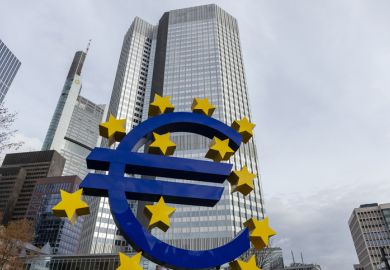The European Union must make the goal of spending 3 per cent of its gross domestic product on research and development a “priority”, Emmanuel Macron has said, calling for a “paradigm shift” in investment to enable Europe to compete with the United States and China.
In a wide-ranging speech at Sorbonne University that lasted almost two hours, the French president warned that “Europe is mortal – it can die”, calling research and higher education “absolutely decisive” in a period of geopolitical and socioeconomic crises.
Describing human capital as “the rarest resource”, Mr Macron said that for Europe to remain a “great power” in research and innovation, it must train, attract and retain more talent. To do so, the EU must “reaffirm” the objective, as set out by the European Council in 2002, of committing 3 per cent of its GDP to research and innovation. Horizon Europe, he added, must be “strengthened”, with focus on the “most effective programmes” such as the European Research Council.
The president also named five “strategic sectors” in which Europe should aim to become a “world leader” by 2030: artificial intelligence, quantum computing, space, biotechnology and new energy sources such as hydrogen and nuclear fusion. The EU “must adopt dedicated financing strategies” to fund these key sectors, he said, while Europe’s computing capacity must increase from 3 per cent of the world’s total to 20 per cent by 2030 to 2035.
While commending the European Innovation Council, which has “made it possible to reach new milestones”, Mr Macron said Europe “must go much further on disruptive innovations”, among them quantum computers, new materials and chips, in order to “reposition” itself on the “geopolitical map of growth”.
Investment in innovation and “the most advanced fundamental research” could also enable Europe to tackle health issues including cancer and neurodegenerative diseases, he said.
The address came almost seven years after Mr Macron’s 2017 Sorbonne speech on the European Union, delivered months after taking office, in which he proposed the establishment of “European universities” among other initiatives.
In his latest speech, he thanked the “university presidents, students and professors” who had since contributed to the creation of 50 European university alliances. The initiative must now progress to a “second stage”, he said, involving the consolidation of funding, increased integration and the establishment of “fully joint European diplomas”.
Last month, the European Commission published a blueprint for a European degree, proposing two routes to the long-awaited qualification. Graduates of joint degree programmes that meet certain criteria could receive a “European degree label certificate”, the commission recommended; alternatively, a new “European degree” qualification could be established and jointly awarded by multiple universities.
Register to continue
Why register?
- Registration is free and only takes a moment
- Once registered, you can read 3 articles a month
- Sign up for our newsletter
Subscribe
Or subscribe for unlimited access to:
- Unlimited access to news, views, insights & reviews
- Digital editions
- Digital access to THE’s university and college rankings analysis
Already registered or a current subscriber?








